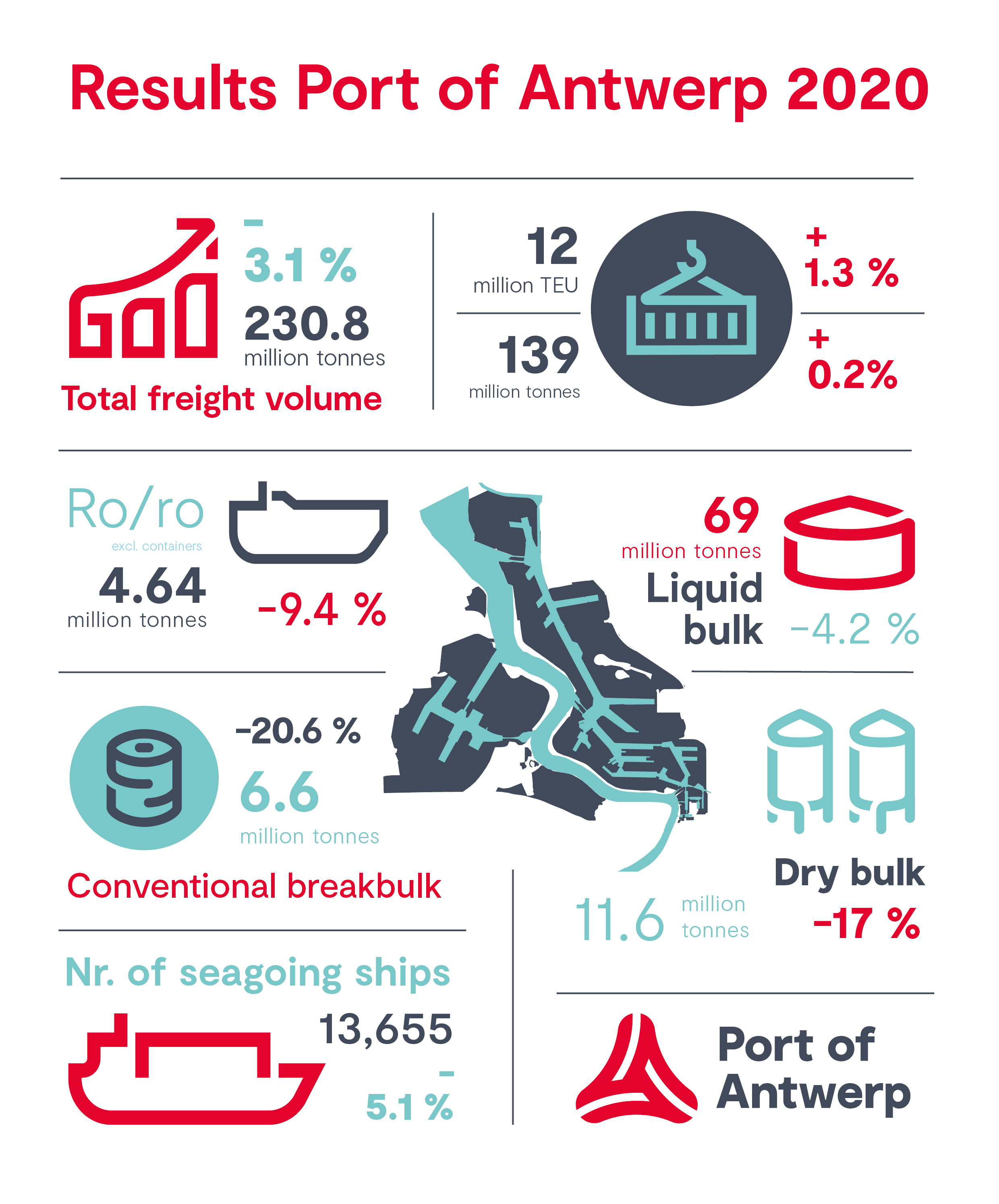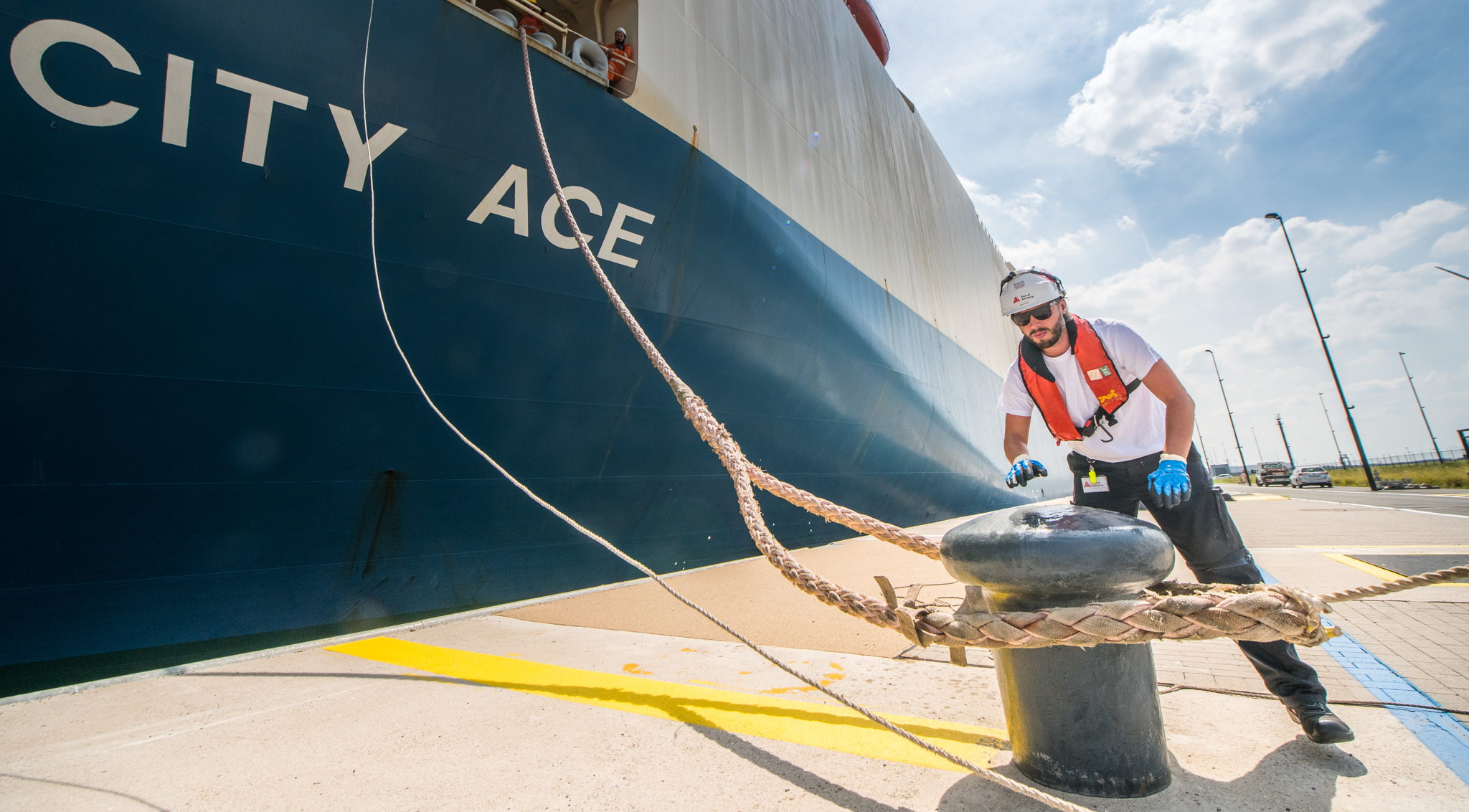Record container throughput limits losses in 2020, the year of coronavirus
Solid foundation for 2021
The total throughput of Port of Antwerp in 2020 amounted to 231 million metric tonnes of cargo, a fall of 3.1% compared with the previous year. Thanks to the buoyant container throughput rates, which set a new record, the port was able to limit the overall decline in throughput. Compared with most other ports in the Hamburg-Le Havre range, the port held up very well despite a year dominated by coronavirus and other trade tensions. The investment in pioneering projects relating to energy transition, digitalisation, and mobility have also laid solid foundations for a sustainable future.
New record in container traffic
Container throughput in the port of Antwerp has been breaking records for years now, and 2020 is no different. Despite a year dominated by coronavirus, with several difficult months and cancelled sailings, container throughput once again saw higher volumes since July. As a result, the 12 million TEU mark was exceeded for the first time in 2020, equating to growth of 1.3% compared with 2019. Thanks to this record in the container segment, the port held up better than most other ports in the Hamburg-Le Havre range in 2020.
Breakbulk segment suffers as a result of trade tensions and the coronavirus crisis
Both coronavirus and the increasing protectionism as a result of global trade tensions had a markedly negative impact on breakbulk goods flows in 2020, resulting in a 16,3% decrease in total throughput compared with 2019. Steel, the main commodity group in this segment, was hit particularly hard. The car sector also suffered as a result of the coronavirus crisis and total RoRo throughput decreased by 9.4%. Throughput of new vehicles in 2020 fell by 21.5% while that of second-hand vehicles fell by 22.5% compared with the same period last year.

Lower demand for liquid and dry bulk
Though the throughput of coal was still growing in the first quarter, it came to a standstill afterwards. Fertilizers, ores, sand, and gravel also saw losses in 2020 while scrap just about held up, resulting in a 17% decrease in dry bulk throughput. This decrease is due to the growing supply of green energy and reduced demand for coal and ores from the steel sector.
Liquid bulk fell by a total of 4.2%. Crude oil throughput fell by 60% due to reduced refining activities. Meanwhile, the throughput of oil derivatives recovered with a growth of 3.4%, despite an initial reduction in demand due to the coronavirus crisis and the sharp drop in the price of oil. Chemicals also saw a fall in demand, which resulted in a drop of 8.9%.
Seagoing vessels
In 2020, 13,655 seagoing vessels called at Antwerp, representing a 5.1% decrease compared with 2019. The gross tonnage of these vessels fell by 5.2% to 394 million.
Pioneering role
In 2020, the port demonstrated its resilience even in difficult times. Despite the crisis, it made progress in terms of greener energy, digitalisation, and mobility through various pioneering projects. The business plan for the coming year continues to build on the 2018-2020 business plan with its three strategic priorities of sustainable growth, targeted transition, and resilience. As such, Port of Antwerp aims to continue playing a pioneering role in the future development of the port, in order to eventually become the global port that reconciles economy, people and climate.
Jacques Vandermeiren, CEO Port of Antwerp: “We were caught up in a storm in 2020, but we stayed upright. The port has even set another record in container throughput. This enabled us to limit the damage due to losses in other segments and to present better figures than other ports. This once again confirms the importance of the container segment and the need to expand the capacity. It will not be smooth sailing in 2021 nor will it be predictable, but we are stronger than before. Despite the crisis, we were more forward-looking than ever in 2020, in terms of energy transition, mobility, and digitalisation. I am convinced that our ambitious projects, such as the CO2 reduction project Antwerp@C, the hydrogen coalition, the digital encryption of containers with the "Certified Pick up" project, and the new development of the NextGen District on the old Opel site will really be major game changers within the next 10 years.“
Annick De Ridder, Port Alderman: "2020 was an unprecedented year of extremes with many unexpected challenges and rapid changes, but also resilience. The port has demonstrated its resilience and we have been able to ensure that the port has remained 100% operational thanks to the expertise and commitment of the port's many thousands of employees. Once again, my thanks for that. Compared to most other ports in the Hamburg-Le Havre range, we are holding our position very well with, moreover, a record in container throughput. The economic urgency for additional container capacity is thus more than ever demonstrated. With numerous innovative projects, we have reaffirmed our pioneering role. In 2021, we will continue this momentum with our submitted relaunch projects such as the pipeline network that can be a key in the energy transition and attention for the railways. In short, we are emphasising resilience, transition and sustainable growth. By taking our lead together with our partners, we confirm and perpetuate our position as a world port"
